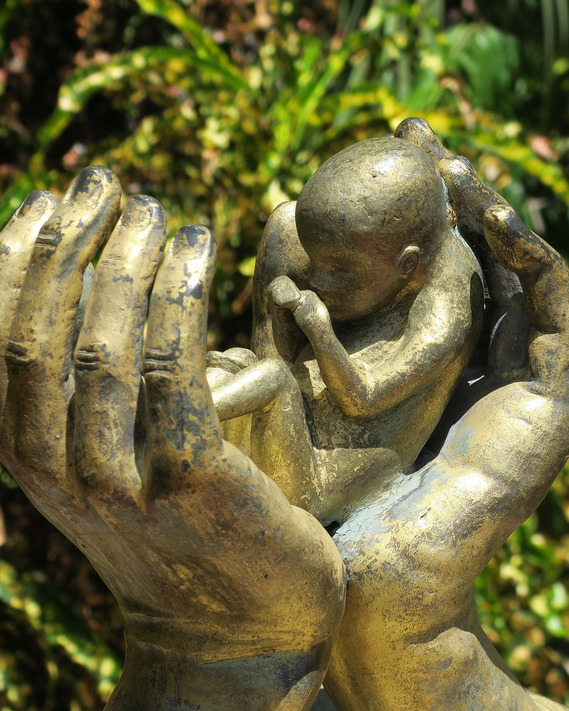Pharisees rationalize sin; so can I
We see all around us a rationalization of sin.
It turns out that there are many people in the US willing to adopt children regardless of the child’s heritage or difficulties. The waiting list is very long and many people end up going to South America, Russia and China to find a child to adopt. I personally know people who have adopted children from each of those places. Why is the waiting list so long? Because there are, on average, 10,000 children aborted each week in the US.
Abortion is only one example, but there are many more.
Image by H. Hach
Pharisees rationalize sin; so can I
By Lou Occhi
https://bible.usccb.org/bible/readings/032721.cfm
Ezekiel 37:21-28
John 11:45-46
Last time I did a reflection it was on the sorrowful mysteries of the rosary. In that reflection we followed Jesus through His suffering from the agony in the garden to His crucifixion. He knows of our propensity to sin so He allowed Himself to be put through that torture for the reparation of our sins and His love for us. Today we will talk about sin and the moment of decision that led to Jesus’ death on a cross.
John 11 starts out with the story of Jesus raising Lazarus from the dead. According to the gospel many began to believe in Jesus as a result of this miracle. Some of the witnesses went to the chief priests and Pharisees and told them what Jesus had done. This news caused great concern to them. These men knew the bible from front to back. They were waiting for the Messiah. Remember that Herod’s advisers knew that it was time for the Messiah to come as a King in Bethlehem. The problem is that Jesus did not fit into their expectations of a conquering king. On top of that Jesus was causing people to stop listening to them. Instead, the people were being converted into becoming disciples of Jesus. So Caiaphas, the high priest, declared that if Jesus kept doing these signs and wonders the Romans would come and take away both their land and their nation. I am not sure how he came to that conclusion. I do not know if he simply made that up to bolster the case he was about to make or if he felt that Jesus would foment a revolution and thereby infuriate the Romans. Regardless of the reason, Caiaphas continued his thought by saying that it would be better that one man should die so that the whole nation may not perish.
This is a classic case of extreme rationalization. When I sin I usually think to myself that there is a perfectly rational reason to continue doing what I planned. For example, if I am at a convenience store and get too much change and start to walk out the door when I realize the error I have two courses of action. I can return the excess change to the cashier or I can rationalize that it is not worth going back into the store because their prices are way too high and I would be inconvenienced. If I decide to keep the extra change for my so called “valid reasons” I have rationalized my sin.
I remember in college getting into a discussions with some friends. Most of them had foldouts from Playboy stuck to their walls. I asked them why they read that filth. I was pretty naïve back then. The standard answer was that they enjoyed the articles. Yeah, sure they did.
So, not only can the Pharisees rationalize a sin but so can I. Even so, planning to kill the Messiah is much more extreme. However, radical rationalization is alive and well even today. When a woman decides to have an abortion or if someone forces her to have an abortion a grave sin is rationalized away. Kermit Gosnell was convicted of only three murders even though he had performed thousands of late term abortions primarily on low income minority women. His logic was that those babies would have lived a terrible life so it was better to kill them now. His standard practice on late term abortions was to deliver the baby alive and then snip its spinal cord. Who knows what was in his mind but he kept hundreds of baby parts in jars in his office. He ended up dying in prison. One thing that is often overlooked is that state and local officials were complicit in supporting his practice by not enforcing laws he violated regularly. Their logic was that if they arrested him it would hurt other abortion clinics in their state. Again we see a rationalization of sin.
It turns out that there are many people in the US willing to adopt children regardless of the child’s heritage or difficulties. The waiting list is very long and many people end up going to South America, Russia and China to find a child to adopt. I personally know people who have adopted children from each of those places. Why is the waiting list so long? Because there are, on average, 10,000 children aborted each week in the US.
Abortion is only one example, but there are many more. There is a concerted effort by national and local officials to restrict the practice of faith. When COVID 19 was at its worst, churches were shut down but pot shops were considered essential services. I asked myself, would I have felt safer from COVID in church or at the local pot shop. Christians missed out completely on Easter last year. Someone somewhere dreamed this up and reasoned that this was the right thing to do.
God knows we will sin and the consequences of sin are not good. As Father Altman eloquently stated “Yes Virginia, there is a hell.” But I have heard people say Jesus died for our sins so there is no problem. We can just bounce along and will go straight to heaven. That my friends is heresy. Jesus did die for our sins. He died for every person from Adam and Eve until the last person is born at the end of time. However, the crucifixion is just one side of the coin. On the flip side is our responsibility to repent. With no repentance there is no forgiveness. Does that mean that God stops loving us when we sin? Absolutely not!
In the parable of the Prodigal Son, remember that the Father was waiting for his son to return and saw him off in the distance. He even ran to his son as soon as he saw him. If the son had not returned to his father then the son would have continued to live his hellish life. However, the father would have always loved his son and would always have been waiting to see him off in the distance walking home.
In the Old Testament there is the story of Nineveh. There, the people from the kingdom were living sinful lives. Jonah went there proclaiming the vengeance of God would be coming for them if they did not repent. The people of Nineveh, including the King, repented and were spared.
By contrast, Sodom and Gomorrah was a hot bed (literally) of sin. God sent angels to the town to save the just. Instead the men and children of the town wanted to sexually assault the angels. No repentance there. The location of Sodom and Gomorrah are known but it is not a tourist destination. It is located close to the Dead Sea and is a barren desert littered with chunks of pure sulphur.
This brings us back to the Pharisees and, of course, Judas. Judas for his part could have repented for what he did. He saw that what he did was wrong and threw his 30 pieces of silver to the ground. Instead of repenting he hung himself. By contrast, Peter betrayed Jesus but repented. As far as Caiaphas is concerned, we do not know if he ever repented. There is no mention of him anywhere in Google land about his life after Jesus.
Fortunately Jesus has provided us with a simple escape clause, confession. In John’s gospel Jesus tells His disciples “Whose sins you shall forgive, they are forgiven and whose sins you shall retain, they are retained.” How simple is that. We don’t even have to dress in sack cloth and sit in ashes.

